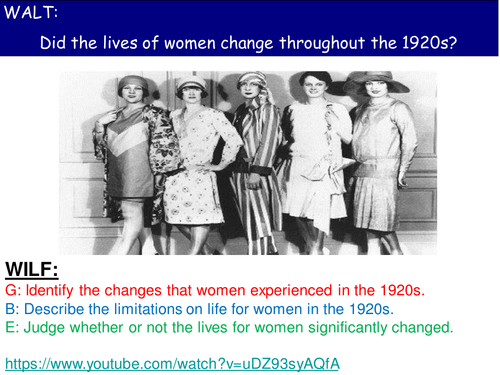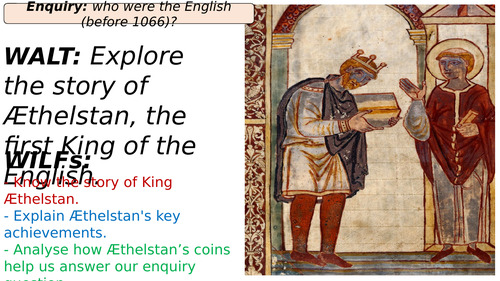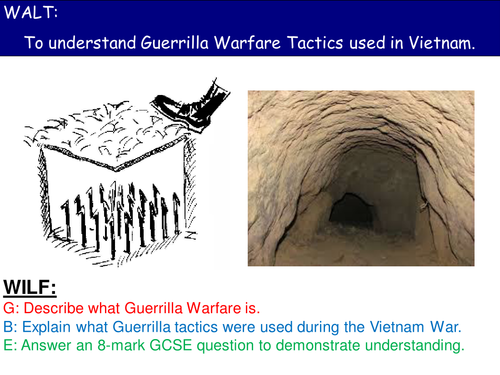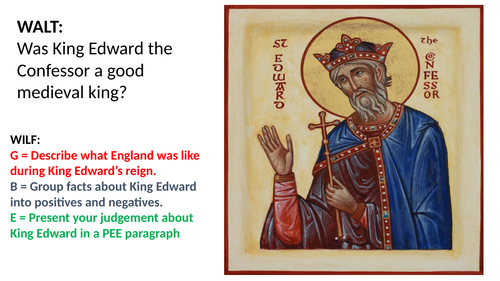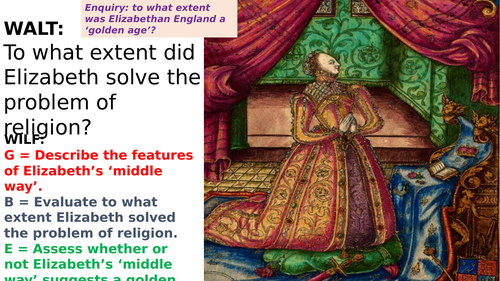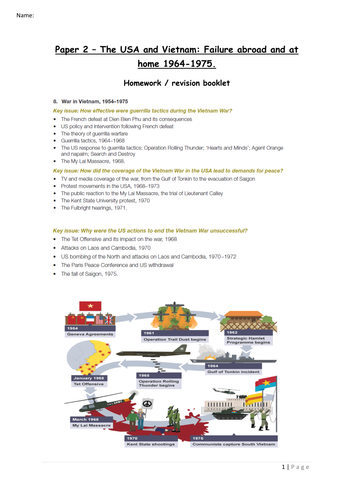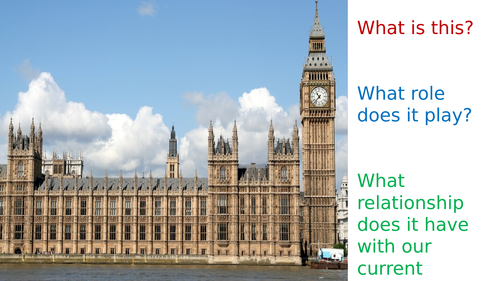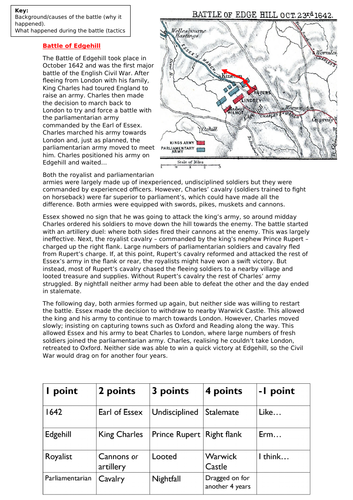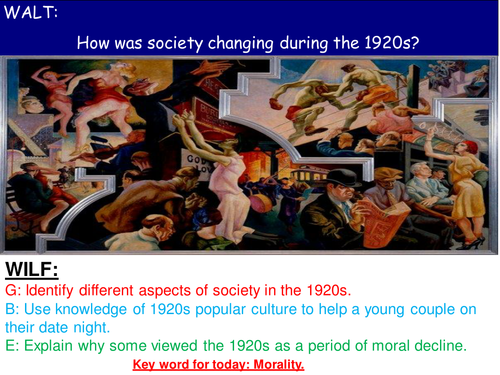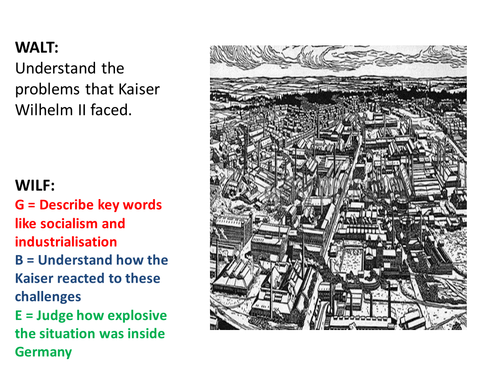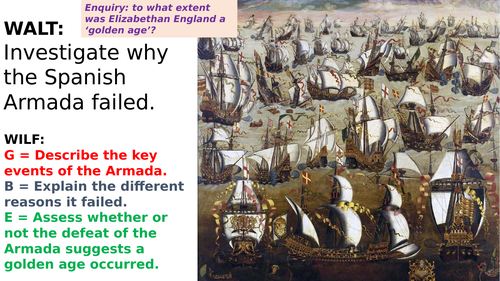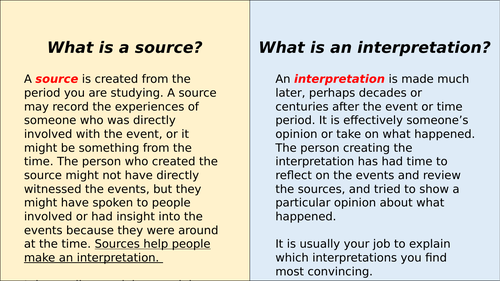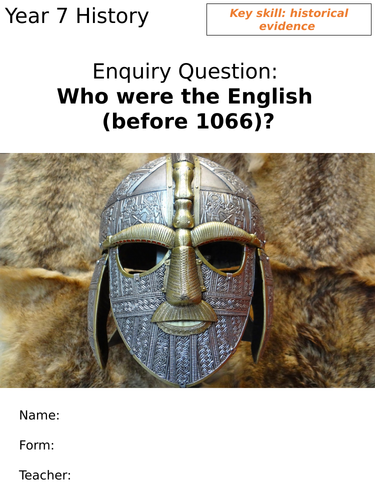
68Uploads
23k+Views
5k+Downloads
All resources
Bundle

Was Elizabethan England a Golden Age?
This is a series of lessons, aimed at Y8, based around the inquiry: to what extent was Elizabethan England a Golden Age? Each lesson comes back to and refers to the arguments of two history teachers: Mr Oldham and Mr Williams.
The series of lessons is as follows:
Inquiry introduction.
Elizabethan Religious Settlement.
Elizabeth and the issue of marriage.
Sailors and exploration during Elizabeth’s reign.
Wealth and poverty in Elizabethan England.
Culture and theatre in Elizabethan England.
Mary Queen of Scots.
Causes of the Anglo-Spanish conflict.
The Spanish Armada.

The Lost Colony at Roanoke (Tudor Exploration and Colonisation)
The mystery of the Lost Colony at Roanoke is explored in this lesson as part of a unit enquiry: ‘how did England become more connected with the wider world between 1492 -1642?’
Includes a video (from Smithsonian channel) introducing the mystery, followed by a task using five pieces of evidence for students to analyse to see what prevailing theories about the fate of the Roanoke Colony are most supported by the evidence. This is followed by an analysis of two interpretations from historians about the fate of the colony. Finally, a ‘counter the codswallop’ plenary.
Intended to be taught to KS3.

Eleanor of Aquitaine
A fully resourced lesson about Eleanor of Aquitaine intended for KS3 (Year 7). The resources include:
A starter ‘do now’ task about gender in the Middle Ages (based on prior knowledge).
An introduction to Eleanor and a knowledge check task.
A timeline task (information about her first marriage on the PowerPoint). Students use the remaining information (based on her second marriage) to complete the timeline.
Consolidation tasks based on the Writing Revolution’s ‘because, but, so…’.
Follow-up tasks based on choosing and explaining Eleanor’s characteristics.
Challenge task also included.

Women & Flappers in the Roarings 20s USA
Changes and limitations of the life of women in the Roaring 20s.

Crime and Punishment Knowledge Organisers (KOs) - Edexcel GCSE History
Inspired by Doug Lemov’s ‘Teach Like a Champion 3.0’, these Knowledge Organisers (KOs) are different from most others. Instead of just being a sheet of summarised information, these are designed to be actively used for revision (instruction page included).
Students use the ‘read, cover, write, check’ method, which involves folding the KO down the dotted line for quizzing / revision purposes.
This resource covers five individual KOs for the Crime and Punishment GCSE History topic:
Middle Ages
Early Modern
18th and 19th centuries
Modern
Whitechapel (historic environment)

Æthelstan, King of the English
This lessons is part of the enquiry: ‘Who were the English (before 1066)’?
The enquiry focuses on the skill historical evidence. Overall, students will refer to five pieces of evidence (Roman skeletons discovered at Aballava fort, Sutton Hoo helmet, Bede’s account of Hadrian and Theodore, the Viking Domesday Stone, and a coin from the reign of King Æthelstan) in order to answer the enquiry question.
This lesson’s main task is a dual-coded narrative of Æthelstan’s life (inspired by the work of Oli Cav). Teacher notes for the story are included on the PowerPoint. Students are to copy out the drawings one-by-one on their blank version. After each strand they then retell the story using only their images. At the end they retell the whole story. They then convert the information into the table or written task afterwards. Other than this the resources on the PowerPoint are hopefully self-explanatory in terms of how to deliver it to students.
You can download the corresponding student booklet for free with all the required work sheets and resources.
The lesson sequence for this enquiry is as follows:
Roman Skeleton Mystery (2 lessons).
Anglo-Saxon Kingdoms and Sutton Hoo (2 lessons).
The Spread of Christianity in England.
Viking Raid on Lindisfarne.
Æthelstan, King of the English
Review lesson: Who were the English (before 1066)?

Empress Matilda, Lady of the English
A lesson intended for KS3 (Y7). Is a fully self-contained lesson. Resources include:
A thought-provoking starter task.
General sources on medieval women.
A cropped video introduction to Matilda embedded into the PowerPoint (from the show ‘England’s Early Queens’.
A guided reading task on the story of Matilda and how gender affected her power in the medieval world.

Guerrilla Warfare and Vietcong tactics. Vietnam War. USA.
A self-contained lesson on VC tactics using during the Vietnam War.

Edward the Confessor - a good king? Pre-Norman Conquest KS3 lesson
A self-contained lesson to be used with KS3 prior to Norman Conquest topic.

Who were the Plantagenets? An Introduction
Designed as a Y7 introduction to the Plantagenets, using Matthew Paris’ illustration as a starting point.

Elizabethan Religious Settlement (Middle Way)
This is the introduction to a series of lessons, aimed at Y8, based around the inquiry: to what extent was Elizabethan England a Golden Age? Each lesson comes back to and refers to the arguments of two history teachers: Mr Oldham and Mr Williams.
The series of lessons is as follows:
Inquiry introduction.
Elizabethan Religious Settlement.
Elizabeth and the issue of marriage.
Sailors and exploration during Elizabeth’s reign.
Wealth and poverty in Elizabethan England.
Culture and theatre in Elizabethan England.
Mary Queen of Scots.
Causes of the Anglo-Spanish conflict.
The Spanish Armada.

Crime and Punishment Revision Booklet (Edexcel GCSE History)
This self-contained revision booklet contains 1x revision quiz and 1x series of practice exam questions for each of the following:
Criminal activity in the Middle Ages
Criminal activity in the Early Modern Period
Criminal activity in the 18th and 19th centuries
Criminal activity in the Modern Period
Punishments in the Middle Ages
Punishments in the Early Modern Period
Punishments in the 18th and 19th centuries
Punishments in the Modern Period
Law enforcement in the Middle Ages
Law enforcement in the Early Modern Period
Law enforcement in the 18th and 19th centuries
Law enforcement in the Modern Period.
Life in Whitechapel
Policing Whitechapel
In addition, a series of mind maps at the end of the booklet for students to complete and colour code.
Revision questions and exam questions are tied to the Edexcel exam spec, but is largely similar to other exam boards’ Crime and Punishment topics.

Vietnam War comprehensive work book (GCSE)
This 35-page long work book covers the Vietnam War starting from why the USA got involved up to the fall of Saigon in 1975.
It features clear and detailed information on all aspects of the war (from combat tactics, to the media coverage and protest movements in the USA).
Most pages feature comprehension style questions with numerous GCSE questions at the back (these are designed for the AQA modern world spec but can easily be adapted).
This booklet has found use as a homework booklet to go alongside a series of lessons and has been used as a comprehensive revision tool.

English Parliament - Henry III, Edward I and Simon de Montfort
2 lessons assessing why the English parliament developed and comparing Parliament under the Earl of Leicester to today’s parliament.

English Civil War Edgehill and Naseby
A self-contained lessons intended to draw comparisons between the Battles of Edgehill and Naseby. Intended for use with Y8.

Kaiser Wilhelm's problems. Industrialisation, socialism and democracy in Germany. AQA GCSE History
Designed to fit in with the new AQA GCSE topic 'Germany, 1890-1945'.

Failure of the Spanish Armada - Elizabethan England
This is part of a series of lessons, aimed at Y8, based around the inquiry: to what extent was Elizabethan England a Golden Age? Each lesson comes back to and refers to the arguments of two history teachers: Mr Oldham and Mr Williams.
The series of lessons is as follows:
Inquiry introduction.
Elizabethan Religious Settlement.
Elizabeth and the issue of marriage.
Sailors and exploration during Elizabeth’s reign.
Wealth and poverty in Elizabethan England.
Culture and theatre in Elizabethan England.
Mary Queen of Scots.
Causes of the Anglo-Spanish conflict.
The Spanish Armada.

To what extent was Elizabethan England a Golden Age? Enquiry Introduction.
This is the introduction to a series of lessons, aimed at Y8, based around the inquiry: to what extent was Elizabethan England a Golden Age? Each lesson comes back to and refers to the arguments of two history teachers: Mr Oldham and Mr Williams.
The series of lessons is as follows:
Inquiry introduction.
Elizabethan Religious Settlement.
Elizabeth and the issue of marriage.
Sailors and exploration during Elizabeth’s reign.
Wealth and poverty in Elizabethan England.
Culture and theatre in Elizabethan England.
Mary Queen of Scots.
Causes of the Anglo-Spanish conflict.
The Spanish Armada.

'Who were the English?' - Student Booklet
This is the student work booklet attached to the lesson sequence and enquiry question: ‘who were the English (before 1066)?’.
The lesson sequence is as follows:
Roman Skeleton Mystery (2 lessons).
Anglo-Saxon Kingdoms and Sutton Hoo (2 lessons).
The Spread of Christianity in England.
Viking Raid on Lindisfarne.
Æthelstan, King of the English
Review lesson: Who were the English (before 1066)?
This workbook features all the necessary resources for all the lessons of the enquiry (therefore no additional printing is required). It also features a Meanwhile Elsewhere homework task (credited. Available separately online).




